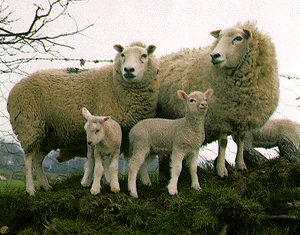Homeopathy - A Shepherd’s Story

As we move towards the Spring Equinox, the start of this new farming season brings with it the challenges of birthing and farm health.
This month, Lynnie Hutchison from Brickpits Organic Farm in East Sussex tells us a bit about her farm, her journey with homeopathy and how it improved livestock health on the farm.
We started by keeping sheep on other people’s privacy land before, in 1999, establishing a 150 acre mixed family farm. My husband, two children and myself, produce organic beef and lamb for direct sales to customers and grow arable crops to support these enterprises. We have a Hereford beef suckler herd with two calvings a year and we lamb 150 ewes outside in April, a mix of Suffolk, Texel, and Lleyns. The farm has some permanent pasture and some arable land in rotation.
By nature I am quite a sceptical person but I’m also prepared to try anything (within reason), to see if it can improve our farming practice. As neither of us came from a farming family we have had to start from the beginning and, prior to buying our land, we learnt a great deal by helping on other people’s farms and constantly asking why something was done a particular way – driving them mad in the process but also gaining some good friends.
Searching for ways to improve the flock’s health
I first started using homeopathy after being dissatisfied that I couldn’t do anything when I could see something was not quite right with an animal, but yet nothing was conventionally wrong enough to need a vet. I wasn’t prepared to wait and see what developed or to hear “Well if it was a racehorse we’d know more about it, but really there’s not that much research on sheep”. In my mind the animal was entitled to better than that; after all, if I feel off colour, I can do something about it. Of course, often for good reasons, we tend to fence and house animals away from the things they would choose to naturally make themselves better, eg Ash bark for its anti-inflammatory properties, Willow for aches and fevers, (Aspirin in its derivative form). Next time you’re nursing a sick animal give it a selection of hedgerow branches and note which ones it chooses.
So in searching for ways to improve the flock’s health and vitality, I bought a small book by Mark Elliot, Homeopathy, the Shepherd’s Guide plus three veterinary homeopathy books by George Macleod. I found them great for starting out with no knowledge of homeopathy as they are written from a conventional perspective.
One particular time in the early days sticks in my mind. A ewe broke her back leg badly above and below the joint probably in a rabbit hole and the vet said it was best to shoot her, or – if she wasn’t in too much pain – I could give her pain relief to get her lambs a few more days with her.

She had twins just a couple of days old and she was standing for them to drink and she appeared not to be in much pain. Desperate to give her a chance I consulted the homeopathic books and we decided to start treating her, with homeopathic remedies and a splint, and within a few days she was putting weight on the leg, and in weeks made a full recovery. Within 2 months you could not have picked her out of the flock even if you put a dog round them and made them move at speed. Now, I know you can’t do a double blind trial and break her other leg just to see if it would have healed as well and as fast without the remedies, no-one would suggest such a thing, but the important thing is the ewe recovered, the lambs had their mum, so no time wasted on bottle feeding and no complications, and she went on to lamb for many more years all of which is a positive outcome for the farm business as a whole.
This success gave us confidence
Our success with this ewe helped us treat other broken bones over the years including my own foot and, when our sheep dog pup jumped out of his run and had a fight with a tractor wheel, breaking his pelvis, we instantly reached for homeopathy to support the vet’s treatments. The Surgery was amazed at his speed of recovery compared to what they would normally expect, and didn’t even bother with follow-up x-rays as they could see how well he was doing. (We did slightly regret the success of the homeopathy treatment when he was feeling so much better that he jumped out of the 4 foot high pen that was supposed to be enforcing the vet’s bed rest!) However, years later he works today on the farm and is as fast and agile as any of the other dogs.
These and many more successes we had early on encouraged us and gave us confidence but also left us with a thirst for deeper knowledge. So in a search for things to help the sheep have excellent health, rather than just absence of disease, we started using homeopathy to treat sheep who seemed a bit off colour but had not yet developed into a condition with a conventional diagnosis. In time as the flock’s vitality increased we had less of these basic problems and now it’s very rare for us to have them at all.

Due to the flock’s good health I guess now lambing is the time when we use homeopathy the most frequently and our lambing students from the Royal Veterinary College have been very interested in the homeopathic approach too. After a difficult lambing and the giving of some remedies they are frequently surprised at the lack of further complications for ewe or lamb.
Difficult decisions sometimes
Of course, in the early days threatened with a difficult situation the confidence to give the remedies a go could sometimes be a difficult decision. For example, we had a case of sudden lamb mortality which I thought was (and proved to be) Pulpy Kidney. The vet recommended we should vaccinate the whole flock, he also said that stress could kill more of them. These are serious things to weigh up, I felt that the implications were complex, bringing in all the ewes and such young lambs to vaccinate them would stress them a lot.
The vaccination could not be used on lambs under 4 weeks, so they would need to come in twice so we could do the whole flock. Immunity from the vaccine takes 6 weeks, so we were warned to expect further losses during that time. No one could answer my questions about the efficacy of the vaccination, the % that would die due to stress of coming in to be vaccinated or % that could still die anyway. For us these where important factors to be considered.
I rang a homeopathic farm vet for advice and support and decided to use a homeopathic nosode immediately; it caused no stress to the flock as it went in the water trough and there were no more fatalities at all. We can never know what would have happened if we had chosen to get the whole flock in and vaccinate, and, if the nosode had failed, the vaccination option would still have been there, but thankfully we didn’t need it.

"I think going back to being without homeopathy now would be like seeing a disaster unfold in slow motion."
When we go back through the vet med records at our annual soil association inspection it’s heartening to see how few entries there are now and the list of remedies which we have used to good effect. And as the years go by and our knowledge increases so does our confidence that we’re making the right decisions.
For us it’s not been about costs but as I think back I realise we have also saved a fortune. Remedies are cheap, the knowledge takes a time to learn but a good stockperson already has fantastic observation skills – they just have to be open to try something different and learn to react to what they see in a different way.

Lynnie Hutchison
Brickpits Organic Farm
East Sussex
For more information, email or call us:
01825 791539
Organic beef and lamb boxes delivered to your door – cuts tailored to your requirements, delivery roughly every three weeks, at your request. We deliver Brighton & Hove, and the surrounding area (including local villages): Ardingly, Sheffield Park, Lindfield, Forest Row, Chelwood Gate, Danehill, Uckfield, Barcombe, Lewes, Ripe, Kingston, Ditchling, and Hassocks.

The WHAg team love to showcase farmers and supporters who epitomise the ethos of ‘Whole Health’. We live and breathe this approach, which flows through us in farming, work, and family.
